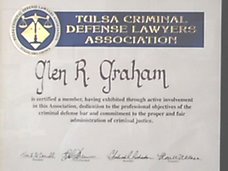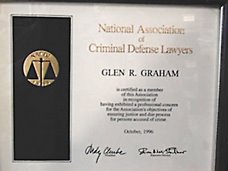Tulsa Oklahoma Application to Revoke Probation or Application to Accelerate Probation
Posted by
Unknown
0
comments
![]()
Arrested for a New Offense While on Probation - What May Happen?
"Look into my crystal ball, now tell me what you see . . . "
The short answer is that it all depends. You should consult with a lawyer in person to determine which possibility is more likely under the specific facts of your case.
It depends upon too many factors to list them all here. However, a short list includes: where the offense occurred, what type of probation, who the sentencing judge is and what are the judges policies and the prosecutor's policies, what is the new offense and what was the old offense, and the prior record, and all of the circumstances, including the probability of being convicted or not being convicted on the new offense.
A big, big, big issue is the probability of being convicted or not being convicted on the new offense and that is the most difficult thing to "predict." Look into my crystal ball and tell me what you see . . . Each case is different so you have to schedule an appointment to discuss all of the facts with a lawyer in person and not just over the telephone. Would you ask a medical doctor to diagnose you over the telephone? Why do people think that lawyers can provide accurate predictions or diagnoses for their legal problems over the telephone and worse, why do some lawyers try to "predict" the future and provide diagnoses over the telephone?
If you are on probation for a drug charge or a driving under the influence charge in Tulsa County and you get arrested for the same type of charge, for example, possession of controlled drug 2nd offense or driving under the influence 2nd offense, either of those charges may be filed as a felony if it is the second offense, (although some drug offenses are a felony on the 1st offense and some are not), depending on what happened on the first offense. An exception would be if you were on a deferred sentence for the first offense, then the second offense would still be a misdemeanor because the first offense was a deferred sentence. Another exception, although rare, is if the defendant is on probation in a city municipal court instead of the Tulsa County or State court, then there is a possibility that the second offense would be filed as a misdemeanor because the first offense was in the municipal court instead of the County Court House or County court.
Most of the time a person is on probation for either a drug charge or a driving under the influence charge and then sometimes they are re-arrested for the same offense that they are on probation for and then they ask ---- what is going to happen. The short answer is that it all depends.
There are multiple possibilities and you absolutely should schedule an appointment and sit down and discuss the possibilities with a lawyer in person. You can call my office to schedule an appointment unless you are already represented by a lawyer.
One possibility is drug court on drug offenses or DUI court on driving under the influence offenses. Drug Court and/or DUI court are treatment oriented programs usually for someone that is a repeat offender and has a substance abuse problem. It is an alternative to incarceration. The person hires a lawyer to represent them and then the lawyer helps the person file an "application" for drug court or dui court with the court and prosecutor. The court schedules an initial hearing to make a determination if the person qualifies. The prosecutor reviews the person's prior criminal record and law enforcement record and any other factors which might have a bearing on the matter. On a case by case basis, the prosecutor may agree to allow the person to apply to drug/dui court or may object the the person applying to drug/dui court. Some of the factors includes --- prior criminal record, violent or non-violent, type of offense - possession with intent or simple possession, gang associations or non-gang associations, circumstances of the offense, various other factors. The person can present documentation and/or arguments to attempt to persuade the prosecutor or the prosecutorial authorities, but ultimately, the prosecutor has the final say. The theory is that the "diversion" program exists because of a contract signed by the prosecutor and the Judges agreeing that the prosecutor has discretion to deny acceptance into the program. Various appeals have been taken on this issue and generally the appellate courts have upheld prosecutorial discretion over the defense arguments for expansion or review of the prosecutorial discretion. On a case by case basis, it is possible to appeal internally in the prosecutor's office and to present new information or supplemental information to attempt to obtain reconsideration. Most often the court will advise the defendant to consider application to the community sentencing court or to appeal for leniency through other alternative treatment programs such as Avalon and other private treatment programs.
If the prosecutor agrees to accept the person into drug court or dui court then the court will require an assessment to be completed by the court approved assessor which costs about $200 dollars and takes about one or two weeks. The assessment is to determine if the person can benefit from DUI/Drug court and if the person admits they have a problem or denies they have a problem and if the person requires the treatment program. If the person denies a treatment problem or if the assessor determines that the would not benefit from the treatment program, then they will be denied admission into drug court or dui court.
Another possibility is that in place of attempting to get into drug court or dui court, the defendant can attempt to fight the case by setting the matter for an issue preliminary hearing. The defendant may want to challenge the search and seizure and the arrest in the new case. The defendant can request a preliminary hearing and the court will schedule a hearing on the matter. In place of attempting application to drug/dui court the defendant can attempt to fight the case.
Typically, after some period of time, a warrant will be issued for an application to revoke probation and the police will arrest the defendant on the warrant for the probation violation. The court usually does not wait for the defendant to be convicted of the new offense to arrest the defendant on the warrant. However, there is a certain amount of unpredictability about when the court will issue the warrant on the application to revoke probation. Sometimes the warrant is not issued for a month or two and typically on the day of the preliminary hearing, then the defendant will be arrested on the warrant for the application to revoke.
The bond on the application to revoke can be high or it may be set at about $5,000 to $10,000 and sometimes even higher. A general rule is usually about $5,000 dollars to about $10,000 dollars in most cases. But, a bond of $15,000 or $25,000 dollars is not unheard of either. A defendant would normally pay about 10% of the bond amount to a bondsman to get out of jail or set up payments with the bondsman.
A smart defendant would ask their lawyer to file a "motion for bond reduction" prior to posting a bond on the warrant. Sometimes the case can be worked out without having to post the new bond.
Some Judge's have a policy of scheduling a fast hearing on an application to revoke probation and other Judge's will wait till after the new case gets in front of them. A lot of this depends upon the individual Judge and the policies of that Judge and the type of case and the unique facts of the case. Each case is different.
What about other types of criminal offenses?
Once again, it all depends. The best thing to do is to schedule an appointment with a lawyer and discuss all of the details about the unique facts of your case and what the options might be in your case.
For instance, if you were on a "deferred" sentence for a burglary case and you were re-arrested for a misdemeanor dui offense, then there are multiple possibilities.
One alternative is that if you were guilty of the dui offense, then the court could convert the deferred sentence to a suspended sentence which would be probation with a felony conviction and would hamper your ability to obtain certain jobs in the future because it would then become a felony conviction that stays on your criminal record for at least ten (10) years or more. Some defendant's even agree to this alternative to avoid doing a short jail sentence even though it results in a felony conviction. However, depending upon all of the facts, some judge's or prosecutor's may require a jail sentence and a conversion of the deferred sentence to a suspended sentence. There is a certain amount of unpredictability because each judge and each prosecutor is different and there are a multitude of factors that they might consider or different policy concerns. If you get a felony conviction for a non-violent offense, then there is a procedure where you can attempt to "seal" (remove from public view) a non-violent criminal conviction but it requires that you wait a whole ten (10) years. If you can keep the deferred sentence so that you do not have a felony conviction and so that you can have a possibility of getting a good paying job in the future and so that at the end of the deferred sentence your case is dismissed and expunged by keeping the "deferred sentence" even if you have to do a short jail or short period of incarceration, it would be worth it in the long run to keep the "deferred sentence.
Another possibility is that your lawyer can attempt to work out an arrangement or plea bargain with the prosecutor that allows you to keep the deferred sentence which means at the end of your deferred sentence then the conviction is expunged so you might still be able to get a good paying job in the future without a "felony conviction." There are a multitude of possibilities and the prosecutor does not have to agree to allow you one of these possibilities but your lawyer can argue for alternative on your behalf and can attempt to get the Judge to consider these alternatives.
Sometimes the prosecutor may agree to some kind of week-end incarceration or in some cases to go to a regimented inmate discipline program for people under the age of 25 years . The RID program is from about six (6) months up to one (1) year and is generally limited to the first prison incarceration. You would be brought back to court and if you did well then the court could allow you to be put back on the "deferred" sentence and allow you to keep it off your record.
Another possibility is that the court could allow you to go to some kind of "in-patient" treatment program through one of the multiple drug and alcohol treatment programs that are located through-out the state and set a review date for you to return to court. Most of them have a waiting list to attempt to get into them.
Another possibility is that the court could allow you to go to a private prison program such as Avalon which is located at Archer and Denver Avenue in Tulsa which requires that you live there for six (6) months to one (1) year and you pay to stay there at a rate of about $175 per week and you are allowed to go to work each day and you check in at night and they perform random urine tests and require treatment.
If the offense that you are on probation for is a felony offense and you are re-arrested for a felony offense, some times the court may require you to serve your sentence or part of your sentence in custody and then give you probation for the balance of your sentence.
If the new case is a domestic violence assault and battery case and the victim fails to co-operate with the prosecutor, then it is possible that the new case may get dismissed at some point in time, if the victim fails to testify or fails to co-operate with the prosecutor in the case.
Each case is different and it depends upon all of the facts of your case and you absolutely should schedule an appointment with a Good Tulsa Criminal Defense Attorney --- my number to schedule an appointment is (918) 583-4621 and my name is Glen R. Graham, Tulsa Criminal Attorney.
Posted by
Unknown
0
comments
![]()
Peak Oil, Inflation, Crime, and Socio-Economic Aspects of Life
Predictions of the dire consequences that may beset society upon oil production reaching it's peak rate and suggestions about the socio-economic aspects and effects on everyday life have been written about by many other people. "Peak oil" has been compared to looking in the rear view mirror and then saying "oh, that was peak oil." There are suggestions that society becomes complacent after oil prices decline and return to "old habits" and seem to forget about high oil prices. Oil production and prices fluctuate and people seem to forget.
Theorists have proposed that peak oil would occur or has occurred in 1995, 2007, 2020, and similar time periods. It seems like some people determine peak oil by looking in the rear view mirror. Some theorize that alternatives to oil may delay peak oil chaos and if those alternative are fully developed then it may be avoided completely.
What does this have to do with crime? If society norms and standards break down due to peak oil chaos then crime escalates and disorder results. Peak oil chaos can cause the destruction of the society.
Why have the "think tanks" and scholars failed to develop sufficient alternatives to oil so that "peak oil chaos" can be avoided. Perhaps they have but have failed to sufficiently market the ideas or to explain the importance of avoiding future chaos by present development. However, there are some progressive thinkers who have attempted to market their ideas: http://www.pickensplan.com and some people are proposing alternatives to petroleum or oil based products: alternative ecological friendly non-petroleum asphalt, also known as bioasphalt, a local Tulsa Asphalt Paver and Repair Contractor has written about this at: http://www.tulsaasphaltcontractor.com/id65.html and http://www.tulsaasphaltcontractor.com/index.html and so have other people.
There have been many suggestions to develop alternatives to inefficient fuel consuming vehicles. I was writing about problems with inefficient over-sized vehicles over 4 years ago and it still doesn't make sense why "leaders" fail to lead. Too often, it's as if leadership has to come from the bottom up. It's like business people and politicians are more "reactive" to public pressure and instead of leading us, the public has to lead them.
Why has our political and business leadership failed us? Where are the think tanks and scholars to devise alternatives and suggest real solutions and to provide ideas for solid solutions to avoid a future of peak oil chaos.
Posted by
Unknown
0
comments
![]()





